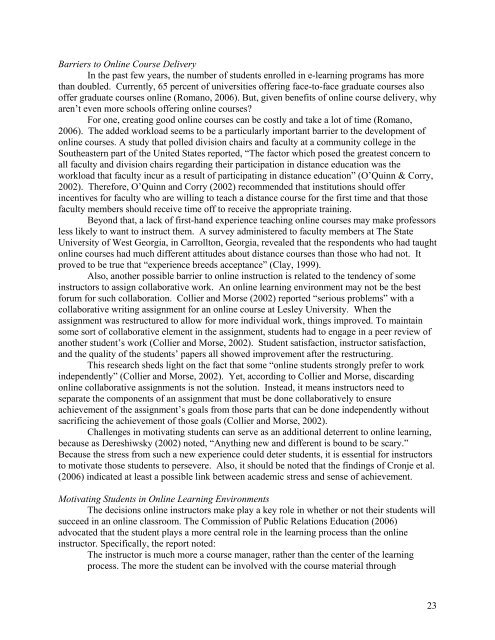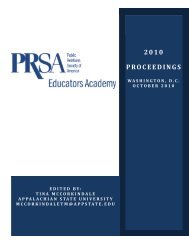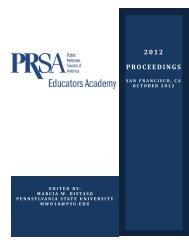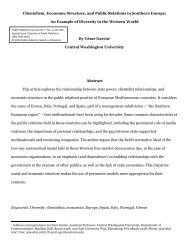2008 PROCEEDINGS - Public Relations Society of America
2008 PROCEEDINGS - Public Relations Society of America
2008 PROCEEDINGS - Public Relations Society of America
Create successful ePaper yourself
Turn your PDF publications into a flip-book with our unique Google optimized e-Paper software.
Barriers to Online Course Delivery<br />
In the past few years, the number <strong>of</strong> students enrolled in e-learning programs has more<br />
than doubled. Currently, 65 percent <strong>of</strong> universities <strong>of</strong>fering face-to-face graduate courses also<br />
<strong>of</strong>fer graduate courses online (Romano, 2006). But, given benefits <strong>of</strong> online course delivery, why<br />
aren’t even more schools <strong>of</strong>fering online courses?<br />
For one, creating good online courses can be costly and take a lot <strong>of</strong> time (Romano,<br />
2006). The added workload seems to be a particularly important barrier to the development <strong>of</strong><br />
online courses. A study that polled division chairs and faculty at a community college in the<br />
Southeastern part <strong>of</strong> the United States reported, “The factor which posed the greatest concern to<br />
all faculty and division chairs regarding their participation in distance education was the<br />
workload that faculty incur as a result <strong>of</strong> participating in distance education” (O’Quinn & Corry,<br />
2002). Therefore, O’Quinn and Corry (2002) recommended that institutions should <strong>of</strong>fer<br />
incentives for faculty who are willing to teach a distance course for the first time and that those<br />
faculty members should receive time <strong>of</strong>f to receive the appropriate training.<br />
Beyond that, a lack <strong>of</strong> first-hand experience teaching online courses may make pr<strong>of</strong>essors<br />
less likely to want to instruct them. A survey administered to faculty members at The State<br />
University <strong>of</strong> West Georgia, in Carrollton, Georgia, revealed that the respondents who had taught<br />
online courses had much different attitudes about distance courses than those who had not. It<br />
proved to be true that “experience breeds acceptance” (Clay, 1999).<br />
Also, another possible barrier to online instruction is related to the tendency <strong>of</strong> some<br />
instructors to assign collaborative work. An online learning environment may not be the best<br />
forum for such collaboration. Collier and Morse (2002) reported “serious problems” with a<br />
collaborative writing assignment for an online course at Lesley University. When the<br />
assignment was restructured to allow for more individual work, things improved. To maintain<br />
some sort <strong>of</strong> collaborative element in the assignment, students had to engage in a peer review <strong>of</strong><br />
another student’s work (Collier and Morse, 2002). Student satisfaction, instructor satisfaction,<br />
and the quality <strong>of</strong> the students’ papers all showed improvement after the restructuring.<br />
This research sheds light on the fact that some “online students strongly prefer to work<br />
independently” (Collier and Morse, 2002). Yet, according to Collier and Morse, discarding<br />
online collaborative assignments is not the solution. Instead, it means instructors need to<br />
separate the components <strong>of</strong> an assignment that must be done collaboratively to ensure<br />
achievement <strong>of</strong> the assignment’s goals from those parts that can be done independently without<br />
sacrificing the achievement <strong>of</strong> those goals (Collier and Morse, 2002).<br />
Challenges in motivating students can serve as an additional deterrent to online learning,<br />
because as Dereshiwsky (2002) noted, “Anything new and different is bound to be scary.”<br />
Because the stress from such a new experience could deter students, it is essential for instructors<br />
to motivate those students to persevere. Also, it should be noted that the findings <strong>of</strong> Cronje et al.<br />
(2006) indicated at least a possible link between academic stress and sense <strong>of</strong> achievement.<br />
Motivating Students in Online Learning Environments<br />
The decisions online instructors make play a key role in whether or not their students will<br />
succeed in an online classroom. The Commission <strong>of</strong> <strong>Public</strong> <strong>Relations</strong> Education (2006)<br />
advocated that the student plays a more central role in the learning process than the online<br />
instructor. Specifically, the report noted:<br />
The instructor is much more a course manager, rather than the center <strong>of</strong> the learning<br />
process. The more the student can be involved with the course material through<br />
23
















